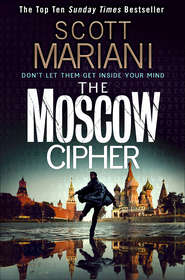По всем вопросам обращайтесь на: info@litportal.ru
(©) 2003-2024.
✖
The Cassandra Sanction: The most controversial action adventure thriller you’ll read this year!
Автор
Год написания книги
2019
Настройки чтения
Размер шрифта
Высота строк
Поля
‘I had no idea,’ Ben said. He laid the magazines at his feet. ‘You told me she was a scientist.’
‘An astronomer,’ Raul said. ‘I also told you she was a little bit more than that. It was the television show that really started the whole celebrity thing. Until then, she was devoted to her work. She taught astrophysics and cosmology for a year in Madrid, then decided she wanted to broaden her horizons. She always had an incredible talent for languages, and could speak four of them fluently by the time she was twenty-one. She had no problem teaching herself German in six months so she could take the lectureship at the University of Munich. She was always a genius, ever since we were kids. She was chairperson of this science board and that, and wrote all these books on solar physics. Then five years ago she became the youngest ever, and only female, winner of the Kilosky Astrophysics Prize. It’s like a more specialised version of the Nobel Prize. Won lots of teaching awards, too. Her students loved her.’
Raul paused sadly for a moment, then went on. ‘Anyway, four years ago, a British television producer asked her if she’d present this six-part series on astronomers in history. Not the ones everyone’s heard of, like Galileo and Newton. Ones like the female American astronomer Henrietta Leavitt, who have been kind of overstepped and forgotten but are still really important. You know?’
Ben just spread his hands. He knew how to navigate by the constellations when GPS went down, but that was about the sum total of his astronomical knowledge.
‘She was young, beautiful, intelligent and as well qualified for the job as anyone, and she thought it was a worthy project to get involved in. She had no idea what great TV it would make and how popular she’d become as a result. She took a sabbatical from her teaching and writing, and travelled all over with the film crew. A year later, the first episode aired on BBC, then RTL in Germany and all around Europe. Suddenly, she was this big media celebrity. It just kind of exploded, not because of the subject matter – I mean, who really cares about a bunch of dead astronomers? It was her the people loved. She set the screen on fire. Next thing, she was getting offers from all over the place for more mainstream shows, and had to start cutting her teaching down to part-time just to fit all the work in. You couldn’t turn on the TV without seeing her.’
‘I haven’t watched it in a while,’ Ben said truthfully. His last place of residence of any duration had been a monastery in the French Alps, where the monks had barely even heard of TV. His being there was another long story, one he didn’t intend to share.
Raul went on, ‘And magazines like this one couldn’t get enough of her. She was the darling of the media. She used to laugh about it all, this science academic getting to rub shoulders with movie stars and pop singers, like she couldn’t take it too seriously and was just enjoying the ride while it lasted. And the money, too.’
‘Okay,’ Ben said. He was soaking up information fast, but he still didn’t understand why Raul Fuentes thought his celebrity sister had been kidnapped. Rich people got kidnapped all the time. The motive was almost invariably financial, which meant the victim’s family could generally expect to receive a ransom demand within hours, sometimes within minutes of the abduction. But that hadn’t happened in this case.
‘She didn’t talk much about the dark side of it all,’ Raul went on. ‘Like all those damn photographers always hanging around, trying to get a shot of her, so many she started having to sneak out of the house in disguise. I think she accepted it, like it just went with the territory. But then the Lukas Geerts thing happened.’
‘Lukas Geerts?’
The corners of Raul’s mouth downturned and he looked as if he’d just got a whiff of something out of a sewer. ‘A Belgian IT consultant and amateur astronomy nerd who’d become fixated on her after watching her on TV. This creep somehow managed to convince himself he was in love with her, and that he could make her love him too, if only he could meet her. He travelled to Munich, hung around the university and followed her home. It was easy for him to find out where she lived, and somehow got her personal mobile number too. Next thing, he was turning up there the whole time. He’d sit outside her place in his car and phone her, ten, twenty times a day. I mean, he had her face tattooed on his arm. Can you believe that?’
Ben had once pursued a child abuser and kidnapper who’d tattooed the names of his victims in Gothic script on every part of his own body, including his genitals. Ben could believe more or less anything.
‘Catalina was freaked out by him and wouldn’t have anything to do with him, of course, but on his Facebook page he was making out that he and she were an item. He created images on Photoshop showing them holding hands. I kept telling her she should report it to the police, but she actually felt sorry for him because he was mentally deranged. Then it got even worse, with the porn stuff he was doctoring to make it look like them together, and putting up online. In the end, she had to get the police involved and there was a restraining order and criminal charges. It was only then it turned out he was guilty of the attempted rape of some poor girl in Zeebrugge a year earlier, and he ended up sentenced to eighteen months behind bars.’
‘I understand. So you think Geerts has come back after her, except now he’s angry and prepared to go to extremes to make her his.’
Ben wasn’t liking the sound of it. Suddenly, the idea of foul play entered the scenario and sounded plausible enough to be a concern. If the motive was about revenge or possession rather than money, a ransom demand became immaterial.
Raul shook his head. ‘No, because Geerts is dead. A few months into his sentence, one of his fellow prisoners stuck a shank between his ribs. I wasn’t exactly sorry.’
‘That would tend to rule him out of the equation,’ Ben said.
‘Him, but not a hundred others. Who’s to say some other lunatic hasn’t turned up there in Munich with a delusional fixation about her? There are crazy people everywhere.’
Ben had been expecting a little more substance to Raul’s kidnap premise. ‘That’s it?’
‘That’s it.’
‘Have you mentioned this to the German police? To the investigator, Klein?’
Raul shook his head. ‘Not yet. It’s a new theory. The only one that makes sense to me.’
‘That’s not a theory, Raul. It isn’t even a hypothesis. It’s more like a guess, based on nothing but the emotions you’re feeling.’
‘That’s why I need someone to help me,’ Raul said.
‘Help you do what?’
‘Prove that she’s not dead. Find who took her, and get her back. I want you to come with me to Germany. I’ll pay for the flight and all expenses. I still have a little bit of savings left over. Whatever we don’t spend on the trip, you take as a fee.’
‘I don’t want your money,’ Ben said tersely.
‘You have to help me. You’re the only person I’ve met who can.’
Ben took out his cigarettes and Zippo, fished out a Gauloise and bathed its tip in the lazy orange flame of the lighter. He puffed for a few moments as he reflected. Thinking that Germany was a long way away, and that he’d come back here to offer Raul moral support, not to get involved in what was almost certain to be a dead-end undertaking that would only cause further heartache. Raul might soon find himself wishing he’d attended his sister’s funeral, after all.
Raul was watching him, worriedly trying to read his thoughts. ‘You told me never to give up. You said those words to me.’
Ben went on smoking. He thought about the girl he’d seen from the bus. Thought about the real reason he’d come back here. If he was honest with himself, maybe it hadn’t been just to offer moral support. Maybe he needed to do more than that, for his own sake as much as that of a stranger he’d met in a bar only that day.
He knew he couldn’t turn away, any more than he could have sat back and let Raul take a bad beating in there.
‘I don’t want you getting your hopes up,’ he said. ‘You have to be ready for the worst. The odds are slim.’
For the first time since Ben had met him, Raul Fuentes allowed himself a smile of relief. ‘One in a billion. But it wouldn’t be the first time those odds paid off, would it?’
Ben looked at him.
‘So you’ll help me?’ Raul said.
Chapter Six (#ulink_9bb1a368-9801-50fb-bfa9-d9ffd69eaefc)
Ngari Prefecture
Autonomous Region of Tibet, China
Five months earlier
The man stood at the top of the rise and gazed around him in an arc thousands of miles wide. The bleak, windswept wilderness that stretched almost to infinity could have been part of the Martian landscape, if not for the vast dome of blue sky above it and the white-capped peaks in the far distance. On clear days like this, the man imagined that he could see as far as the Trans-Himalayas that bordered the Tibetan plateau to the south and west, and the top of holy Mount Kailash: in the Tibetan language, ‘Kangri Rinpoche’, meaning ‘Precious Snow Mountain’. For Buddhists, the sacred Navel of the Universe; for Hindus, the perpetual abode of Lord Shiva, the destroyer of ignorance and illusion.
What total, utter bollocks. The man did not believe in such things, and felt only contempt for the poor benighted suckers who did.
The man’s name was Maxwell Grant. He turned to face north, the wind slapping him in the face and clawing at his suit. It was an Ermenegildo Zegna three-piece, and far too good for sitting around in helicopters and getting covered in dust, but it was tailored to hide his bulk well and made him look every bit as important as, in fact, he was.
He smiled as he surveyed the industrious scene in the giant, desolate bowl of rock and earth below. After twenty years in the business, the sight still impressed him. From up here on the rise, it looked like an ants’ nest of fantastic proportions as a battalion of labourers in khaki uniform swarmed and toiled around the edges of what looked like a monstrous volcanic crater, or the remnants of a cataclysmic asteroid impact. The hole was hundreds of metres across and went down at least as deep, waiting to swallow up the container loads of drums that were Grant’s responsibility to make disappear. The dust from the diggers rose up in huge clouds that were whipped away by the wind and caked the clothes, faces and hair of the workers. What the heavy plant didn’t dig out of the hole was hacked and shovelled and dragged out of there by hand by the mass of men, working like slaves in a scene from ancient history. Others scurried back and forth from the trucks, rolling out the cargo and placing it on wooden pallets ready to be lowered into the pit. They were Chinese prisoners brought here aboard the same military train as the cargo itself, and the eighty or more People’s Army soldiers standing guard with assault rifles to ensure the job was done. Grant’s own private army, mostly ex-military themselves, were there to supervise the soldiers. It was a slick operation that Grant had witnessed many times before, in many parts of the world.
This, Grant believed in. And for good reason. It had made him a very rich man. With a personal net profit close to nine figures over the last year, he was doing even better out of this enterprise than from his other main business interest, the one he could talk about, Grantec Global.
The cargo had been shipped from a location in western Europe aboard a superfreighter called the MV Charybdis, under false papers that in no way could be traced either to Grant himself or his anonymous company name, Kester Holdings. On docking at the Chinese port of Shenzhen after its month-long voyage, the containers had been unloaded by crane and placed on military trailer trucks originally designed for transporting tanks. From there, the convoy of trucks had taken it to an army rail depot, where the huge vehicles had rolled up onto the even more massive military train already loaded with troops and prison labourers.
The purpose-built railway stretched many hundreds of miles northwards through China and deep into the mountains of Tibet, the line itself mostly carved out by chain-gangs of convicts. Threat of execution made them the most effective workers, and by definition they were the cheapest. However many dropped dead of exhaustion, were crushed by heavy machinery or shot while trying to escape, fresh reserves were always readily available.
The cargo consisted of 892 drums of high-level nuclear waste. Each drum contained 55 US gallons or 208 litres, and measured 35 inches in height by 24 inches in diameter. Their yellow paint was scored and scuffed from rubbing together in transit, and many of them were already showing signs of corrosion after their long sea voyage. They’d eventually rust through, but by then it wouldn’t matter, at least not to Grant. The occasional drum might rupture as it degraded, and if it wasn’t buried deeply enough the small explosion could sometimes break the surface, spewing radioactive white foam that resembled whipped cream and would remain lethally radioactive for hundreds of thousands of years.
Grant didn’t care much about that, either. They had unlimited space out here. Every time they excavated a new site, it was far enough away from the last one to avoid contaminating too many of the convicts. They were routinely checked for radiation after handling the merchandise. If one of them made the Geigers crackle, the soldiers would just put a bullet in the bugger and toss his body in the pit. It was the cheapest solution to the problem. These communists understood free enterprise better than most nations.
The nuclear waste dumping facilities came courtesy of the Ninth Academy, the most secretive organisation within the whole of China’s extensive nuclear programme. It was largely thanks to the Ninth Academy that, in the years since its annexation to the People’s Republic in 1951, Tibet had steadily developed into China’s Nuclear Central. First they’d ravaged the unspoilt wilds for their plentiful uranium resources, then they’d used the country for conducting nuclear weapons tests, and now it was used as a convenient dumping ground for nuclear waste – not just from the vast territory of China itself, but from all over the planet.











